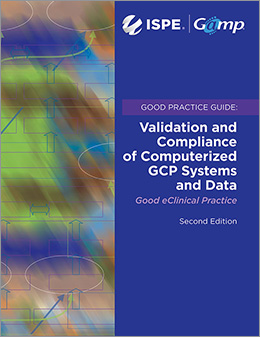GAMP Good Practice Guide: Computerized GCP Systems & Data 2nd Edition

Published: July 2024
Pages: 258
Advances in digital health, increased regulatory scrutiny, and the integration of new technologies such as artificial intelligence and new models such as decentralized trials have been accelerated by the COVID 19 pandemic. In light of this, the content of the ISPE GAMP® Good Practice Guide: Validation and Compliance of Computerized GCP Systems and Data – Good eClinical Practice (Second Edition) has been significantly expanded to foster a robust validation framework to help support the integrity and efficiency of clinical trials.
The Guide discusses the increased complexity of hybrid or participant-centric decentralized trials. The Guide offers best practices for managing this complexity, which is caused by various factors such as a greater reliance on contractor/subcontractor processes and the use of participant-owned digital health technologies and devices (for example, a smart phone).
The benefits and challenges of using open-source software have been added in this revision.
The use of data science and AI-enabled systems is covered in some depth, building on the ISPE GAMP® 5: A Risk-Based Approach to Compliant GxP Computerized Systems (Second Edition). Aspects specific to clinical trials considered are the nature of learning from data, human oversight and control, avoiding potential bias in model results, avoidance of harm, and transparency and human-machine interaction.
The appendix on real world data/real world evidence discusses key challenges such as ensuring data quality and standardization, and protecting patient privacy by implementing robust data anonymization and stringent security measures.
Additionally, guidance on data privacy (for both trial participants and sponsor/service provider personnel) and good clinical laboratory practices has been expanded. Included in this revision is an example supplier assessment questionnaire (Assessment of Clinical Site Systems).
In a structured way, the ISPE GAMP® Good Practice Guide: Validation and Compliance of Computerized GCP Systems and Data – Good eClinical Practice (Second Edition) discusses the processes involved in clinical studies, highlighting the unique challenges to collecting data by investigators that is later processed and analyzed by sponsors and/or suppliers. It then provides validation approaches for the varied systems used in each process. Additionally, suggestions are offered for developing common systems applicable to multiple studies to minimize customization while meeting the unique needs of the individual project that is a clinical study.
The goal of the Guide remains the same: to provide a comprehensive framework that supports effective and efficient validation of computer systems used in GCP environments, thereby safeguarding the rights, safety, and well-being of trial participants while ensuring the credibility and reliability of clinical data.
Guide Core Team
For the full list of contributors to this Guide see Guidance Document Teams










